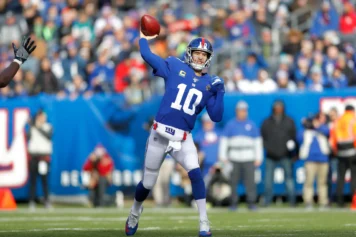In his directorial debut, The Man With The Iron Fists, Robert Diggs—better known to all of you as The RZA of the Wu-Tang Clan—plays a foreigner in an adopted land. There, he must overcome seemingly insurmountable odds, create allies and quickly identify foes. While, at the same time, advancing his unique craft and source of income.
In other words, the movie is RZA's metaphor for his real life as a legendary hip-hop producer who wants a new career as a director in Hollywood. Perhaps.
Except that being "The Blacksmith," as his lead character is called, he has a sole skill: Making weapons for the warring clans that people the film's fictional "Jungle Village." "He's basically an arms dealer," RZA says, no pun intended. (The character loses his meat hooks in an act of devastating brutality…then replaces them himself, like a 19th century bionic man. Thus, the title.)
But while the Blacksmith only masters heavy metal, his alter ego has had to overcome the demands of both directing and acting in a feature film…and also co-writing and scoring it. (His daughter even contributed to costume design.) When one considers this is his first movie, one concludes that RZA is either a genius, a stupendous workaholic, easily bored, or a control freak psychopath. Or all of the above.
Yet, whatever he is, he's certainly headed where hip-hop has yet to go, followed by Iron Fist's major talents: superstars Russell Crowe, Lucy Liu, presenter Quentin Tarantino, co-scribe Eli Roth (the Saw series), and legions of martial arts luminaries ("Guys I sampled in my music," RZA admits).
In fact, only one actor turned down The RZA: "The Lizard," aka Philip Kwok, from 1978's Five Deadly Venoms. But that doesn't mean others didn't try.
The Shadow League: Didn't Russell Crowe have a similar response, at first?
The RZA: Well, Russell never declined, but he wasn't sure he wanted to do this film. He's a serious actor; probably one of the best actors in the world. Less than a hundred men have received the [Academy] award for Best Male Lead Actor, and he has it twice! So, I understand him feeling not as comfortable working with a first-time director in a kung fu film!
But as he got to know me, and we talked about the film, he recognized that I was a true artist.
And what made him recognize that?
Um…different things I did in my music. He’s even seen me on the stage, performing. And he's seen me on the set of films with him.
And, also, I think what really helped me is, after he read my book, The Tao of Wu — the book made The New York Times' best sellers list, it's very visual…in fact, they're talking about making it into a play, now — I think he realized that I wasn't the average rap guy/musician guy. There was something very artistic about me, in a different way. And I think that led to him supporting me on this film.
Why did you make this movie?
Oh, this movie is a dream. This is a dream of a kid, Harry, that walked through New York City, watching kung fu movies on 42nd St. Cut school to watch these movies, me and Ol' Dirty. And I always had a dream of making a kung fu movie. Always had a dream of me being in a kung fu movie, to be actual. My first two kung fu movies were Fury of the Dragon, which is Bruce Lee as Kato, and Black Samurai, which is Jim Kelly, so, hey, I knew there was room in there for me, somewhere.
Those were the first two you ever saw?
First two, I ever seen in my life, was those two.
Which one did you see first?
It was a double feature!
Which was the first to play, actually?
Oh…Fury of the Dragon. Actually, you know, in those days, you could walk into the theater in the middle of a movie. So, we walked in, in the middle of Fury of the Dragon, and then Black Samurai played all the way through, and then we watched Fury of the Dragon over again.
That was on 42nd Street?
No, that was actually at the St. George Theater on Staten Island. The second group of kung-fu films I saw was on 42nd St., where it was a triple feature!
What did you watch?
To my memory, I think we watched Godfather from Hong Kong…um…Fearless Fighters…and the other one was called Ghostly Fighter, but the name's been changed. You can't find this one no more. I never actually seen this one again, besides twice on the 42nd St. But it was a triple feature, and good range, because one, Fearless Fighters, was all about the first time we seen a woman jump across the ocean. (we both crack up)
RZA, what attracted you to the genre of kung fu films? Why are you so compelled by them?
I think, first of all, it was the action and the cinematography – what they was doin' – that really blew my mind. The only films I seen, prior to kung fu films, were Tom Sawyer & Huckleberry Finn…Star Wars…The Swarm…and, then, kung fu movies! And then Rocky!
But all films have action and cinematography. What was it about kung-fu films that drew you in?
Well, even if you loved Batman as a kid, him and Robin was cool, fightin'. But when Kato came on Batman, you was like, "Yo, who's this guy?" You know whumsayin'? He tore Robin up, kid. So martial arts had somethin' else special about it, to my eyes.
But I wanna say what really sucked me in to it, though—to, whereas, I went around and named my crew "Wu-Tang Clan"—was, as a teenager, watching these films, I started seeing it wasn't just about the kung fu. It was sacrifices they was makin'. It was brotherhood. It was loyalty. It was fightin' against oppression.
And, also, the Buddhism philosophy, when it came to Shaolin, was instilled in these films. Thirty-Six Chambers, when I finally saw it at the age of 13, 14, I saw the scene where he was saying words like, "…and the five tones deafens every ear." "Without wisdom, there is no gain." That resonated with me, yo, and I was already studying mathematics, so it caused me to go and read more about their philosophy, more about their culture.
I remember me and Ol' Dirty Bastard, we would cut school, watch a kung fu movie, go down to Chinatown, buy a kung fu book (chuckles), and on the weekend, try to learn kung fu from a book.
I'm wondering, to what degree did what you see in those films, counteract what you witnessed around you? When you talk about "brotherhood," "loyalty," "sacrifice," those are things that are often hard to come by, especially if you're in a place that's impoverished, or where there's a lot of crime, or conflict.
I agree. I mean, at one point, I think these films were escapism for me.
And idealism!
Yeah, and idealism. But, at the same time, I felt it. New York was already past the gang era, when I was growing up. But yet, when you look at Wu-Tang Clan, you kind of see the reemergence of brotherhood, the reemergence of loyalty, the reemergence of sacrifice. These are the things that kept us bonded.
This is why Wu-Tang has said, "Wu-Tang forever." We all come from different walks. I'm a common denominator of the group, but…
What do you mean by that?
That everybody knew me, but everybody didn't know each other. But, yet, through me, and, and I guess, through this concept that I was able to instill, we all became brothers. To this day, we all refer to each other as "brothers."
You leveraged the skills and reputation that you've acquired in the music business to get you into the film business. How are the two worlds different?
Well, filmmaking is a very, very special craft, and it's a very collaborative art. Of course, music-making, it takes craft, and it takes collaboration, but I have to say film is taking this same energy to the 10th power.
Because, let's say, if you do have a band, you may have five members in the band, six members, and maybe you got the engineer…maybe twelve people, at most, are going to be the people that make a album.
For a film? We had up to 400 people working on the set with us. Watch the end credits on Superman, the first movie. Those end credits are about…15 minutes long, yo! Because that's how many people have to help to get that job done, and it's all done under the supervision and mind power of a director.
Why aren't more hip-hop artists moving in the direction that you have?
Well, that question, I don't know, but I could say that, to move in this direction, it takes focus, it takes dedication, and it takes a lot of time put into it.
Hip-hop is a fast-paced-moving genre of music. And for somebody to get into this, they really would have to sit still for a minute. And that's what I did: I came to California, and I sat still.



